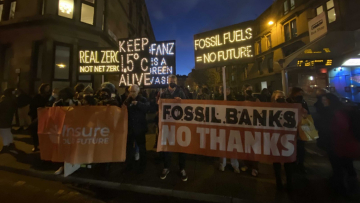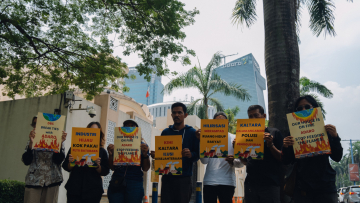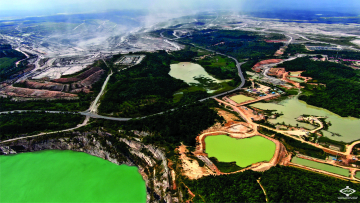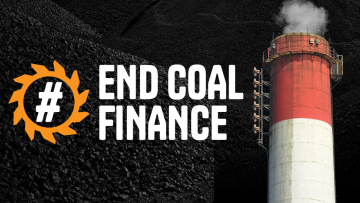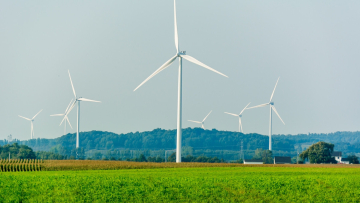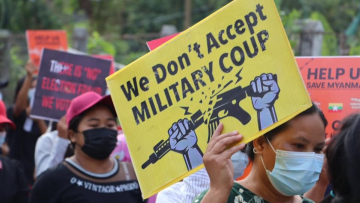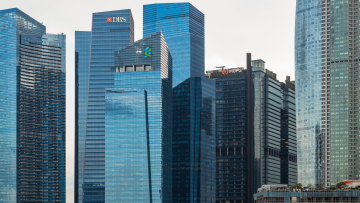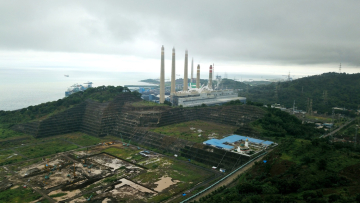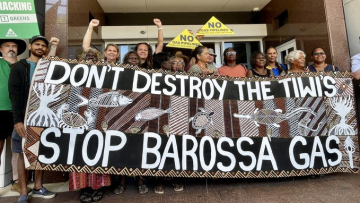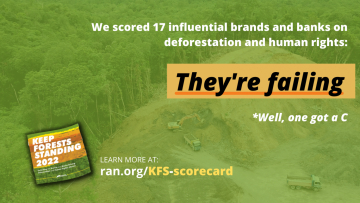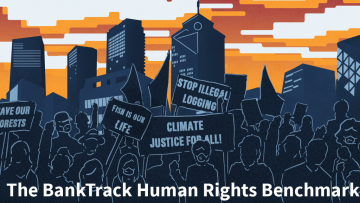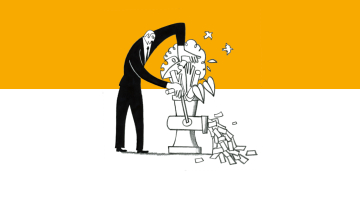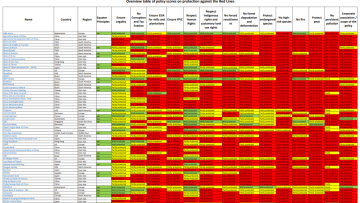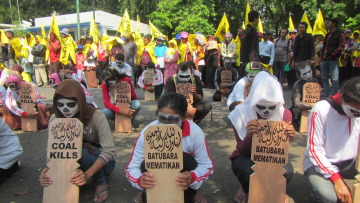
Active
This profile is actively maintained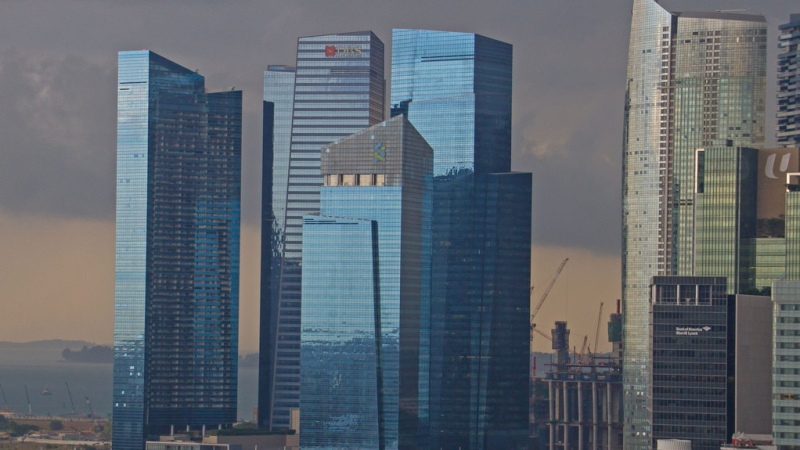
Active
This profile is actively maintained| Website | http://www.dbs.com/ |
| Headquarters |
12 Marina Boulevard, Marina Bay Financial Centre Tower 3, Level 3
018992
Singapore
|
| CEO/chair |
Tan Su Shan Deputy CEO |
| Supervisor | |
| Ownership |
listed on Singapore Stock Exchange (SGX)
DBS' complete shareholder structure can be accessed here. |
Development Bank of Singapore (DBS) is headquartered in Singapore and was established in 1968. The bank operates mainly in Asia. It is involved in the following sectors: retail banking, capital markets, foreign exchange and derivatives, money market and securities trading to corporations and financial institutions.
DBS' most important sustainability commitments can be found at the website sections listed below.
DBS is linked to a number of companies and projects that BankTrack considers controversial (so called Dodgy Deals), e.g. as a current or past financier or through an expression of interest. The profiles below provide more details on the nature of DBS's link to these deals.
DBS does not operate a complaints or grievances channel for individuals or communities that might have been affected by the bank's finance.
DBS is an Equator Principles signatory. While the Equator Principles have no official grievance mechanism, complaints relating to this bank's financing of Equator Principles projects can be filed through our own website www.equator-complaints.org.
This page evaluates DBS's responses to instances of alleged human rights violations linked to its finance, raised by civil society organisations. It is not intended to be exhaustive, but covers selected impacts raised by BankTrack and other civil society partners since 2016. For the full scoring methodology, see here. For more information about BankTrack's evaluation of bank responses to human rights impacts, see the 2021 report "Actions speak louder: assessing bank responses to human rights violations".
Banks and Climate
The 2025 Banking on Climate Chaos report showed that DBS provided $13.8 bn in financing to the fossil fuel industry between 2021 and 2024. In 2024 only, DBS provided $2.6 bn, including $762 mn for oil, gas and coal companies expanding fossil fuels. Find further details on DBS's fossil fuel portfolio and how it compares to other large banks globally on the Banking on Climate Chaos website below.
Partner organisation Reclaim Finance tracks the coal, oil and gas policies of financial institutions, including banks, in their Coal Policy Tool (CPT) and the Oil and Gas Policy Tracker (OGPT). BankTrack works closely with Reclaim Finance and endorses their policy assessments. Find further details on their assessment of DBS’ fossil fuel policy below.
False Solutions Tracker expansion
The purpose of the False Solutions Tracker is to give a clear overview of energy technologies that fall under banks' individual sustainable finance commitments. The tracker lists 11 energy technologies that are usually associated with the energy transition and the decarbonisation of the economy. These technologies are defined here and classified in three categories:
-
Real solutions: Technologies that deliver on a Just Transition towards Energy Democracy. BankTrack considers these technologies as real solutions only if and when they do deliver Energy Democracy.
-
Solutions under strict conditions: Energy technologies that could be real solutions if they deliver on a Just Transition towards Energy Democracy but that could also be false solutions. This is the case of hydrogen and hydropower. On one hand, fossil-free and green hydrogen could be a real solution under certain conditions. However, fossil-based hydrogen and nuclear hydrogen are always false solutions. On the other hand, hydropower lifespan extension could also be a real solution under strict conditions while hydropower expansion is a false solution.
-
False solutions: Energy technologies that are not aligned with a just transition towards Energy Democracy, such as solid biomass, biofuels and carbon capture, utilisation and storage (CCUS).
For each one of the 11 energy technologies, the tracker indicates if it is included in bank's individual sustainable finance commitments:
For Real solutions:
- : Yes, the bank includes its finance towards this energy technology in its sustainable finance reporting.
- : Yes, the bank includes its finance towards this energy technology in its sustainable finance reporting, but under certain conditions. In this case, those conditions are mentioned in the "relevant policy document" section for each bank.
- : No, the bank does not include its finance towards this energy technology in its sustainable finance reporting.
- : It is unclear whether the bank includes or not its finance towards this energy technology in its sustainable finance reporting.
For solutions under strict conditions and for false solutions:
- : Yes, the bank includes its finance towards this energy technology in its sustainable finance reporting.
- : Yes, the bank includes its finance towards this energy technology in its sustainable finance reporting, but under certain conditions. In this case, those conditions are mentioned in the "relevant policy document" section for each bank.
- : No, the bank does not include its finance towards this energy technology in its sustainable finance reporting.
- : It is unclear whether the bank includes or not its finance towards this energy technology in its sustainable finance reporting.
Banks and Human Rights
BankTrack assessed DBS in its 2022 Human Rights Benchmark Asia, where it achieved 3 points out of 14 and was ranked as a 'laggard'. More information is detailed in the "Accountability" section of this profile.
Human Rights Benchmark Asia 2022
Banks and Nature
DBS’s policies for forest-risk sectors (beef, soy, palm oil, pulp and paper, rubber and timber) have been assessed by the Forests & Finance coalition, achieving an overall score of 5 out of 10 and ranking it as a front runner. DBS achieved a score of 0 out of 10 specifically for its policies related to the beef sector and 6.2 out of 10 for its policies related to the palm oil sector. In addition, BankTrack and the Environmental Paper Network have assessed DBS’s policies related to the pulp and paper sector.
Between 2016 and 2022, DBS provided USD 4,151 in credit to companies operating in these forest-risk sectors and held investments amounting to USD 105 as of 2022. For more information, see the links below.
Forest & Finance Policy Assessment 2022: Overall scores
A bank can obtain a total of 10 points for the quality of its policies. The total score is based on their scores per sector, weighted against their financing and investment for each sector. For further details on this see here. Based on their overall score, banks are then classified as Laggards, Followers, Front runners or Leaders, as follows:
Forest & Finance Policy Assessment 2022: Beef
A bank can obtain a total of 10 points for the quality of its beef policy. The total score is based on their scores per sector, weighted against their financing and investment for each sector. For further details on this see here. Based on their overall score, banks are then classified as Laggards, Followers, Front runners or Leaders, as follows:
Forest & Finance Policy Assessment 2022: Palm Oil
A bank can obtain a total of 10 points for the quality of its palm oil policy. The total score is based on their scores per sector, weighted against their financing and investment for each sector. For further details on this see here. Based on their overall score, banks are then classified as Laggards, Followers, Front runners or Leaders, as follows:
Tracking the Net Zero Banking Alliance
DBS is a member of the Net Zero Banking Alliance (NZBA) and has therefore committed to reduce its financed emissions to net zero by 2050; within 18 months of joining the alliance set interim targets for 2030 (or sooner) for high emission priority sectors, and within 36 months set further sector targets; set new intermediary targets every 5 years from 2030 onwards; annually publish data on emissions and progress against a transition strategy including climate-related sectoral policies; and take a robust approach to the role of offsets in transition plans. BankTrack track's implementation of these commitments in the NZBA compliance tracker.
Banks and Steel
As part of the Net Zero Banking Alliance (NZBA), DBS is required to set interim targets for 2030 for high emission priority sectors. For DBS, this includes its lending to the steel sector. You can see DBS’s iron and steel decarbonisation targets, and its progress towards meeting them in our NZBA steel targets compliance tracker:
Partner organisation Reclaim Finance’s 2023 report on metallurgical coal financing showed that DBS provided US$ 3.1 billion in loans and underwriting to developers of new metallurgical coal between 2016 and 2022. Find further details on DBS’s metallurgical coal financing and and how it compares to other large banks globally in the report.
Reclaim Finance tracks the metallurgical coal policies of financial institutions, including banks, in their Coal Policy Tool. BankTrack works closely with Reclaim Finance and endorses their policy assessments. Find further details on their assessment of DBS's metallurgical coal policy below.
Banks and Russian Aggression in Ukraine
BankTrack is keeping track of the public response of DBS to Russia's illegal invasion of Ukraine. DBS did not publicly condemn the war. DBS is scaling back with its operations in Russia. We consider its exposure to Russia as limited. For further details, see the table linked below.







